 Mr Wijat's friend Magic Rabbit
Mr Wijat's friend Magic Rabbit  http://www.easterlingentertainment.net
http://www.easterlingentertainment.netINLNews YahooMail HotMail GMail AOLMai
lUSA MAIL YahooMail HotMailGMail AOLMail MyWayMail CNNWorld IsraelVideoNs
INLNsNYTimes WashNs AustStockEx WorldMedia JapanNs AusNs World VideoNs WorldFinance ChinaDaily IndiaNs USADaily BBC EuroNsABCAust
WANs NZNews QldNs MelbAge AdelaideNs TasNews ABCTas DarwinNsUSA MA
Stories Video/Audio Reuters AP AFP The Christian Science Monitor U.S. News & World Report AFP Features Reuters Life! NPR The Advocate Pew Daily Number Today in History Obituaries Corrections Politics LocalNews BBC News
International News Limited Domain Pricing Per Year
.com* $9.99 | .net* $9.99 | .org* $9.99 | .info* $9.99 | .us* $9.99 | .biz* $9.99 | .ws* $9.75 | .name* $7.95
Save even more on multi-year registrations!
Visit International News Limited for the best values on: domain names, domain transfers and more!
Click Here For Your Up To Date World Live Sports Scores
INLNews YahooMail HotMail GMail AOLMailUSA MAILYahooMail HotMailGMail AOLMail MyWayMail CNNWorld IsraelVideoNs INLNs NYTimes WashNs AustStockEx WorldMedia JapanNs AusNs World VideoNs WorldFinance ChinaDaily IndiaNs USADaily BBC EuroNs ABCAust WANs NZNews QldNs MelbAge AdelaideNs TasNews ABCTas DarwinNsUSA MAIL
also see www.YahooUSANews.com and www.YahooUKNews.com
for world-USA-UK historical Video News for September and October 2008
Click here for email login for YahooRealEstate.com.au
all from $9.99
International News Limited Domain Pricing Per Year
.com* $9.99 | .net* $9.99 | .org* $9.99 | .info* $9.99 | .us* $9.99 | .biz* $9.99 | .ws* $9.75 | .name* $7.95
Save even more on multi-year registrations!
Visit International News Limited for the best values on: domain names, domain transfers and more!
FULL COVERAGE News Iraq Zimbabe Myanmar Radovan KaradzicChina » All Full Coverage
ABC News Video FOX News Video FOXBusiness Video CNN Video AP Video BBC News Video Reuters Video AFP Video CNET Video
CNBC Video Australia 7 News Video Rocky Mountain News Elections Video CBC.ca Video NPR Audio Kevin Sites in the Hot Zone Video
Richard Bangs Adventures Video Charlie Rose Video Expanded Books Video Assignment Earth Video ROOFTOPCOMEDY.com Video
Guinness World Records Video weather.com Video AccuWeather Video You Witness News User Video
NPR Audio BY CATEGORY Top Stories Politics World Business Sports Technology Health & Science Arts U.S.
VIEW LOCAL VIDEO KVUE-TV Austin WJZ 13 Baltimore WBZ Boston WCNC Charlotte CBS 2 Chicago
CBS 11 Dallas CBS4 Denver 13 News, WVEC Hampton Roads 11 News Houston CBS 2 / KCAL 9 Los Angeles
WHAS TV11 Louisville CBS4 Miami WCCO Minneapolis WWL-TV, Channel 4 New Orleans CBS 2 New York
CBS 3 Philadelphia KTVK 3TV Phoenix KDKA Pittsburgh KGW NewsChannel 8 Portland, Ore. WRAL.com Raleigh
CBS 13 / CW 31 Sacramento KENS 5 - TV San Antonio Channel 8 San Diego CBS 5 San Francisco
KING5 Seattle KREM.com Spokane/Coeur d'Alene KMOV Channel 4 St. Louis FOX 11 Tucson
Video by Category
U.S. Business World Entertainment Sports Tech Politics Science Health Environment Weather Opinion Odd
Video by Topic Campaign '08 Wall Street Iraq Gas Prices Mideast Conflict Climate Change
More INL News Video !Finance Sports
'Why didn't nobody notice?' 'Why did nobody notice?'
'Why did nobody notice?'The Queen has questioned why experts failed to predict the credit crunch, saying the situation is 'awful'. » More
Why banks won't pass on rate cuts
Royal Family - full coverage
President-Elect
http://www.welt.de/english-news/article2704430/Obama-meets-with-President-Bush-at-White-House.htmlObama meets with President Bush at White House
U.S. President-elect Barack Obama visited the White House on Monday for his first post-election meeting with President George W. Bush, a strikingly symbolic moment in the transition of power. Obama, who will take office on January 20, urged Bush to take immediate action in light of the financial crisis.
US President George W. Bush (left) and President-elect Barack Obama meet in the Oval Office of the White House on November 10, 2008. Bush and Obama held private talks that likely included the faltering economy, the wars in Iraq and Afghanistan and terrorist threats.


Current president George W. Bush and first lady Laura greeted newly elected president Barack Obama and his wife, Michelle, with smiles and handshakes, even as Obama’s advisers reviewed some of Bush’s executive orders with an eye to reversing them after he is sworn in on Jan. 20.
The two men met privately in the Oval Office for over an hour in talks thought to have encompassed the global financial crisis, the wars in Iraq and Afghanistan and other daunting challenges the Republican president will bequeath to his Democratic successor.
It was their first face-to-face encounter following Obama’s resounding victory over Republican John McCain in Tuesday’s election, which will make him the United States’ first black president.
Obama, 47, had repeatedly attacked Bush’s "failed policies“ on the campaign trail, and the Illinois senator swept to power on a theme of change -- specifically, change from the unpopular president’s approach to economics and foreign affairs.
Top congressional Democrats have asked the Bush administration to consider aid to the automakers through the financial bailout initiative that has so far covered banks and other financial services companies, and Obama urged Bush to act quickly at their meeting, according to The New York Times.
Citing people familiar with their discussion, the Times said Bush indicated he might support some aid for the auto industry and a broader economic stimulus package if Obama dropped his opposition to a free-trade pact with Colombia.
Obama’s aides say after taking office he will likely move quickly to roll back Bush’s executive orders that limit stem cell research and expand oil and gas drilling in some areas.
But members of Obama’s team cautioned on Monday he had not yet decided whether to reverse executive orders.
There was no outward sign of tension, however, when the Obamas stepped from their limousine at the south portico of the White House. Earlier, they had been cheered by crowds of onlookers as their motorcade sped through the capital.
"Good morning,“ Laura Bush chirped, though it was well past noon.
Obama put his hand on Bush’s back cordially as the two couples entered the mansion. The leaders then strolled down the colonnade side by side, chatting. Obama was the more animated of the two, gesturing with both hands. He had never set foot in the Oval Office before and was ushered in ahead of Bush.
While their husbands met, the first lady gave Michelle Obama a tour of the White House living quarters, which will soon be her family’s new home and where daughters Malia, 10, and Sasha, 7, will be running the halls.
SENSE OF URGENCY
At the end of a two-hour visit, Bush and Obama had nothing to say to reporters and both camps were mostly tight-lipped. White House spokeswoman Dana Perino would only say that domestic and international issues were discussed and that Bush "again pledged a smooth transition.“
Obama spokeswoman Stephanie Cutter said the leaders agreed on the need to cooperate in the changeover "in light of the nation’s many critical economic and security challenges.“
Later, as Obama’s plane sat on the airport tarmac in Washington before taking off for Chicago, journalists onboard overheard snippets of a cell phone conversation the president-elect had with an unknown party.
"I am not going to be spending too much time in Washington over the next several weeks,“ Obama said.
Newly elected presidents traditionally visit the White House between election and inauguration but usually wait longer than Obama did. He came calling at Bush’s invitation after only six days, underscoring a sense of urgency in the transition.
It will be the first wartime transfer of power in four decades and comes amid economic upheaval at home and abroad.
Financial markets, struggling in a global credit crunch, are awaiting news of Obama’s appointments for key jobs such as Treasury secretary, but a spokeswoman for Obama said on Monday he would not make any Cabinet announcements this week.
Obama said in his first post-election news conference on Friday he would not be rushed into making hasty decisions.
Underscoring Obama’s assertion he will not act as a shadow president during the transition, an aide confirmed what the White House had been saying -- that he will not attend a global financial summit in Washington on Friday and Saturday.
Bush, whose low approval ratings helped propel Obama to victory, has said he will do all he can to help in the changeover.
Though visits by incoming presidents to the White House before taking office are a ritual dating back decades, there was little denying Obama’s tour carried special significance.
The son of a black father from Kenya and white mother from Kansas, Obama made history by winning the presidency, an achievement seen as a breakthrough in U.S. race relations.
The new First Lady of the U.S.A.
Obama wins a historic presidential election
Obama's victory speech in Chicago
From Washington to Obama
The beloved pets of past presidential families
McCain lost due to gaffes, Obama
Previous presidents of the United States of America

George Washington (February 22, 1732 - December 14, 1799) served as the first President of the United States of America (1789-1797), and led the Continental Army to victory over the Kingdom of Great Britain in the American Revolutionary War (1775-1783).

John Adams (October 30, 1735 - July 4, 1826). He was elected second President of the United States (1797-1801) after serving as America's first Vice President (1789-1797) for two terms. He is regarded as one of the most influential Founding Fathers of the United States.

Thomas Jefferson (April 13, 1743 - July 4, 1826) was the third President of the United States (1801-1809), the principal author of the Declaration of Independence (1776), and one of the most influential Founding Fathers for his promotion of the ideals of republicanism in the United States.

James Madison, Jr.(March 16, 1751 - June 28, 1836), the fourth President of the United States (1809-1817), and one of the Founding Fathers of the United States.

James Monroe (April 28, 1758 - July 4, 1831) was the fifth President of the United States (1817-1825). His administration was marked by the acquisition of Florida (1819); the Missouri Compromise (1820), in which Missouri was declared a slave state.

John Quincy Adams (July 11, 1767 - February 23, 1848) was an American diplomat and politician who served as the sixth President of the United States from March 4, 1825 to March 4, 1829. He was a member of the Federalist, Democratic-Republican, National Republican, and later Anti-Masonic and Whig parties.

Andrew Jackson (March 15, 1767 - June 8, 1845) was the seventh President of the United States (1829-1837). He was military governor of Florida (1821), commander of the American forces at the Battle of New Orleans (1815), and eponym of the era of Jacksonian democracy.

Martin Van Buren (December 5, 1782 - July 24, 1862) was the eighth President of the United States from 1837 to 1841. He was a key organizer of the Democratic Party, a dominant figure in the Second Party System, and the first president who was not of British or Irish descent.

William Henry Harrison (February 9, 1773 - April 4, 1841) was an American military leader, politician, the ninth President of the United States, and the first President to die in office. The oldest President elected until Ronald Reagan in 1980, Harrison had served 30 days in office, still the shortest tenure in United States presidential history, before his death in April 1841.

John Tyler, Jr. (March 29, 1790 - January 18, 1862) was the tenth President of the United States (1841-1845), and the first ever to obtain that office via succession. He was also the first and one of only two (along with Andrew Johnson) to have no party affiliation during part of his term.

James Knox Polk (November 2, 1795-June 15, 1849) was the eleventh President of the United States, serving from March 4, 1845 to March 4, 1849. A Democrat, Polk served as Speaker of the House (1835-1839) and Governor of Tennessee (1839-1841) prior to becoming president.

Zachary Taylor (November 24, 1784 - July 9, 1850) was an American military leader and the twelfth President of the United States. Known as "Old Rough and Ready", Taylor had a 40-year military career in the U.S. Army.
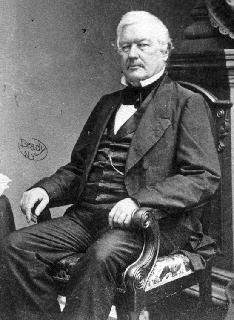
Millard Fillmore (January 7, 1800 - March 8, 1874) was the thirteenth President of the United States, serving from 1850 until 1853, and the last member of the Whig Party to hold that office.

Franklin Pierce (November 23, 1804 - October 8, 1869) was an American politician and the fourteenth President of the United States, serving from 1853 to 1857. To date, he is the only president from New Hampshire. Pierce was a Democrat and a "doughface" (a Northerner with Southern sympathies) who served in the U.S. House of Representatives and Senate.

James Buchanan, Jr. (April 23, 1791 - June 1, 1868) was the fifteenth President of the United States (1857-1861). To date he is the only President from Pennsylvania, and is the only never to marry.
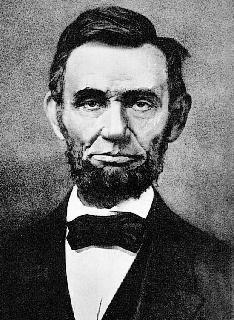
Abraham Lincoln (February 12, 1809 - April 15, 1865), the sixteenth President of the United States, successfully led his country through the American Civil War, only to be assassinated as the war was coming to an end. Before becoming the first Republican elected to the Presidency, Lincoln was a lawyer, an Illinois state legislator, a member of the United States House of Representatives.
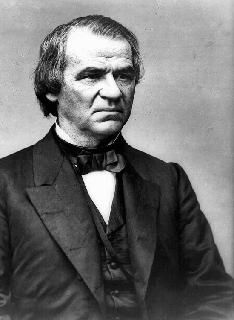
Andrew Johnson (December 29, 1808 - July 31, 1875) was the seventeenth President of the United States (1865-69), succeeding to the Presidency upon the assassination of Abraham Lincoln. He was one of only two U.S. Presidents to be impeached.

Ulysses S. Grant, born Hiram Ulysses Grant (April 27, 1822 - July 23, 1885), was an American general and the eighteenth President of the United States (1869-1877). He achieved international fame as the leading Union general in the American Civil War.

Rutherford Birchard Hayes (October 4, 1822 - January 17, 1893) was an American politician, lawyer, military leader and the nineteenth President of the United States (1877-1881). Hayes was elected President by one electoral vote after the highly disputed election of 1876.

James Abram Garfield (November 19, 1831 - September 19, 1881) was the twentieth President of the United States. His assassination, six months after he assumed the Presidency, means that his tenure is the second shortest in United States history.

Chester Alan Arthur (October 5, 1829 - November 18, 1886) served as the twenty-first President of the United States. Arthur was a member of the Republican Party and worked as a lawyer before becoming the twentieth vice president under James Garfield.
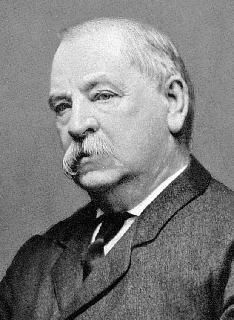
Stephen Grover Cleveland (March 18, 1837 - June 24, 1908) was both the twenty-second and twenty-fourth President of the United States. Cleveland is the only President to serve two non-consecutive terms (1885-1889 and 1893-1897) and thus is the only individual to be counted twice in the numbering of the presidents.

Benjamin Harrison (August 20, 1833 - March 13, 1901) was the twenty-third President of the United States, serving one term from 1889 to 1893.

Stephen Grover Cleveland was the only Democrat elected to the Presidency in the era of Republican political domination that lasted from 1860 to 1912.
Stephen Grover Cleveland (March 18, 1837 - June 24, 1908) was both the twenty-second and twenty-fourth President of the United States. Cleveland is the only President to serve two non-consecutive terms (1885-1889 and 1893-1897) and thus is the only individual to be counted twice in the numbering of the presidents.

William McKinley, Jr. (January 29, 1843 - September 14, 1901) was the twenty-fifth President of the United States, and the last veteran of the American Civil War to be elected.
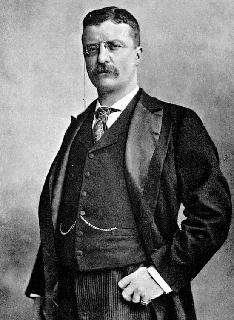
Theodore Roosevelt (October 27, 1858 - January 6, 1919), was the twenty-sixth President of the United States. A leader of the Republican Party and of the Progressive Party, he was a Governor of New York and a professional historian, naturalist, explorer, hunter, author, and soldier.

William Howard Taft (September 15, 1857 - March 8, 1930), the twenty-seventh President of the United States, the tenth Chief Justice of the United States, a leader of the progressive conservative wing of the Republican Party in the early 20th century, a pioneer in international arbitration.

Thomas Woodrow Wilson (December 28, 1856 - February 3, 1924) was the twenty-eighth President of the United States. A leading intellectual of the Progressive Era, he served as President of Princeton University and then became the Governor of New Jersey in 1910.

Warren Gamaliel Harding (November 2, 1865 - August 2, 1923) was the twenty-ninth President of the United States, serving from 1921 until his death from a heart attack, aged 57, in 1923. A Republican from Ohio, Harding was an influential newspaper publisher.

John Calvin Coolidge, Jr. (July 4, 1872 - January 5, 1933) was the thirtieth President of the United States (1923-1929). A Republican lawyer from Vermont, Coolidge worked his way up the ladder of Massachusetts state politics, eventually becoming governor of that state. His actions during the Boston Police Strike of 1919 thrust him into the national spotlight.

Herbert Clark Hoover (August 10, 1874 - October 20, 1964) was the thirty-first President of the United States (1929-1933). Besides his political career, Hoover was a professional mining engineer and author.

Franklin Delano Roosevelt (January 30, 1882 - April 12, 1945), often referred to by his initials FDR, was the thirty-second President of the United States. Elected to four terms in office, he served from 1933 to 1945 and is the only U.S. president to have served more than two terms. Franklin and Theodore Roosevelt were related but only distantly.

Harry S. Truman (May 8, 1884 - December 26, 1972) was the thirty-third President of the United States (1945-1953). As the thirty-fourth vice president, he succeeded Franklin D. Roosevelt, who died less than three months after he began his fourth term.

Dwight David "Ike" Eisenhower (October 14, 1890 - March 28, 1969) was the thirty-fourth President of the United States from 1953 until 1961 and a five-star general in the United States Army. During the Second World War, he served as Supreme Commander of the Allied forces in Europe, with responsibility for planning and supervising the successful i







